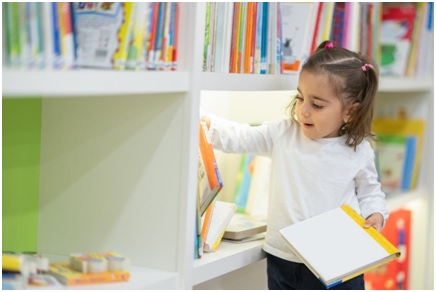How To Teach Preschoolers Care For Books?
Each time you see your preschoolers with a book do you secretly cringe there will be some tearing and destruction! – Well, fair enough to think the thinkable as it’s only natural. Expensive or not, books are treasures and we want them to last. Nevertheless, we also want our children to develop a connection with books. So how do we teach our kids to take good care of books so that they can enjoy it over and over again!
For starters, both parents and teachers can a special area for reading. It will help to keep them from traveling, also reading space can ground kids to calm and relax where they can instill a sense of grounding. Courses like diploma in pre and primary teacher training online can help in developing strategies to bring more learner-centric approach in the classroom.

Here are some tips on how you can teach young learners to take care of books –
You Be The Example
We all know that children are observers. They adapt to behave largely on what they see around themselves. Kids watch the adults around them. So, make sure you show them how to treat books well and also encourage them to do the same. For instance, if you are reading a book, show them how to turn the page carefully, how to put it back to where it belongs. Of course, it may take time, however, guide and support them especially when they forget.
Read To Them
Children love stories. Food for thought, Children don’t destroy things that they love. So make sure you are taking advantage of this opportunity and help them to develop a love for reading and listening. This way they can treat their books as a treasure that needs to be taken special care of. When we spend time reading stories to our kids, they soon learn to connect with the book and thus can relate to the bookand the times they spend with it.
Give Them Time & Space To Learn
Children sometimes do that are instinctual. Hence at all costs avoid expecting things randomly and be reasonable. In a world where everything is new to them, books are too. give them time to spend time looking at and reading books on their own as it allows them to understand how books work. This is where the role of age appropriation comes.
We need to understand certain behaviors are acceptable at a certain age. For children below 3 years old, it’s completely normal for babies to chew the corners of books as they tend to put everything into their mouths. Additionally, books show signs of wear and tear after a while, so all of these need to be taken care of before we start expecting our children to care for their books.
Have A Designated Storage
Book storage is essential. Having a designated place allows children to relate to the concept of organization. Having bookshelves, a special place to store books can help children to take responsibility and the care of books. In school, a reading corner in a classroom can provide a clear idea of where books belong. At home, children can keep a few of their favorite books in their room and rest on the common shelves and use them when they need.
Repair Books Together
As we spoke about books are meant to wear and tear, you can teach children how to repair the damage. This could be even a fun activity for kids to do with you where they fix something. You can make it a game for them to first locate which are the books that need help and then fix the tears wherever needed. It can teach kids to repair books as they build their skills in taking care of it naturally.
Final Thoughts
Children need our guidance and support while they develop healthy habits. It is no different when it comes to taking care of books. It needs time, patience, practice, and encouragement. Kids will learn much faster when they experience that reading is enjoyable and the moment they spend with it is precious.
Above all, avoid having too many rules, as it ruins all the fun. When you establish too many rules with books, it also can create fear for the child to even touch books. Try keeping things simple and let them make mistakes.
Teachers with pre and primary teacher training courses can use their 21st century teaching skills to make the learning space safe for children where they can explore and grow their love for learning.















